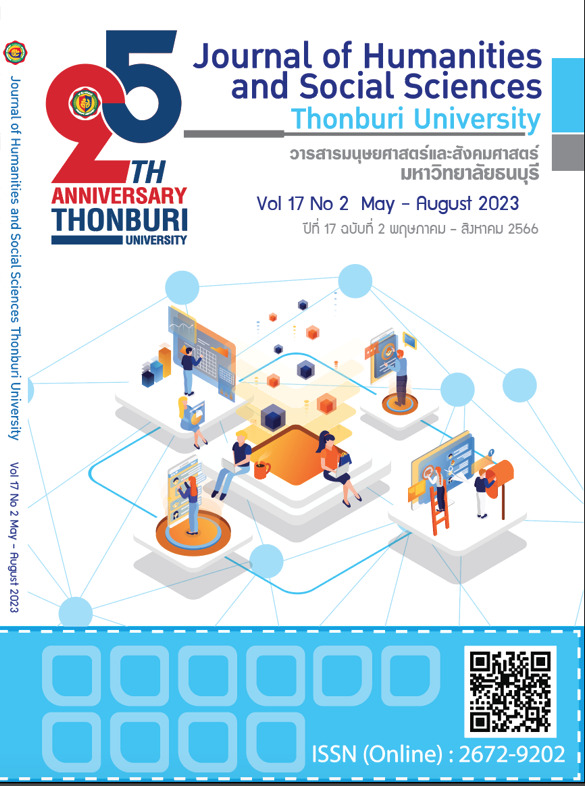Environment and Organizational Culture towards Employee Retention
Keywords:
Environment, Organization Culture, Employee RetentionAbstract
This article has the objectives 1. To study the concepts, theories and research related to the environment on the issue of Job satisfaction, engagement, and perceived organizational support. 2. To study concepts, theories and research related to organization culture in the area of general knowledge of organization culture and elements of organization culture 3. To study the relations between the environment and organization culture in the organization. 4. To study concepts, theories and research related to employee retention in terms of the definition of employee retention. 5. To study the environment and organization culture towards personnel retention. 6. To suggest guidelines for employee retention in terms of problems, obstacles, and problem solving and advantages of development opportunities for employee retention.
References
Adeoye, A., O. & Hope, O. (2020). Organizational Culture, Employee Retention and Employee Loyalty: Empirical Evidence from Nigeria. Academic Journal of Economic Studies, 6(3): 139–145.
Allen, D. G. & Shanock, L., R. (2013) Perceived Organizational Support and Embeddedness as Key Mechanisms Connecting Socialization Tactics to Commitment and Turnover among New Employees. Journal of Organizational Behaviour, 34: 350-369.
Anitha, J. & Begum, F., N. (2016). Role of Organizational Culture and Employee Commitment in Employee Retention. International Journal of Asian School of Business Management, 9(1): 17-28.
Armstrong, M. & Taylor, S. (2014). Armstrong’s Handbook of Human Resource Management Practice. 13thed. Philadelphia: Kogan Page Limited.
Armstrong, M. (2020). A handbook of human resource management practice. 10thed. Philadelphia: Kogan Page Limited.
Beardwell, J. & Thompson, A. (2017). Human Resource Management A Contemporary Approach. 8thed. United Kingdom: Pearson Education Limited.
Chatterjee, A., Pereira, A. & Bates, R. (2018). Impact of individual perception of organizational culture on the learning transfer environment. International Journal of Training and Development, 22(1): 15-33.
Christeen, G. (2015). Retaining Professional Workers: What Makes Them Stay?. Employee Relations, 37(1): 102-121.
Colquitt, J., A., LePine, J. A. & Wesson, M. J. (2019). Organization Behavior Improving Performance and Commitment in the Workplace (6th ed.). New York. McGraw-Hill.
Cross, R., Rollag, K., Opie, T. & Pryor, G. (2017). Connect and Adapt: How Network Development and Transformation Improve Retention and Engagement In Employees’ First Five Years. Organization Dynamics, 47(2): 115-123.
Das, B., L. & Baruah, M. (2013). Employee Retention: A Review of Literature. Journal of Business and Management, 14(2): 8-16.
Gaile, A. (2013). External Factors Facilitating Development of The Learning Organization Culture. Journal of Business Management, 7: 130-140.
Ghapanchi, A., H. & Aurum, A. (2011). Antecedents to IT Personnel’s Intentions to Leave: A Systematic Literature Review. Journal of Systems and Software, 84: 238-249.
Goldstein, H., W., Pulakos, E., D., Passmore, J. & Semedo, C. (2017). The Wiley Blackwell Handbook of the Psychology of Recruitment, Selection and Employee Retention. UK. John Wiley & Sons Ltd.
Inabinett, J., M. & Ballaro, J., M. (2014). Developing an Organization by Predicting Employee Retention by Matching Corporate Culture with Employee’s Values: A Correlation Study. Organization Development Journal, 32(1): 55-74.
James, L. & Mathew, L. (2012). Employee Retention Strategies: IT Industry. SCMS Journal of Indian Management, 9(3): 79-87.
Jeong, Y. & Kim, M. (2021). Effects of perceived organizational support and perceived organizational politics on organizational performance: Mediating role of differential treatment. Asia Pacific Management Review, 27(3): 190-199.
Kossivi, B., Xu, M., & Kalgora, B. (2016). Study on Determining Factors of Employee Retention. Open Journal of Social Sciences, 5(4), 261-268.
Loutier, O., Felusiak, L., Hill, C. & Pemberton-Jones, E., J. (2015). The Importance of Developing Strategies for Employee Retention. Journal of Leadership, Accountability and Ethics, 12(2): 119-129.
McShane, S., L. & Von Glinow, M., A. (2018). Organizational behavior emerging knowledge global reality (8th ed.). New York. McGraw-Hill Education.
Parmenter, J., & Barnes, R. (2021). Factors supporting Indigenous employee retention in the Australian mining industry: A case study of the Pilbara region. The Extractives Industries and Society, 8: 423-433.
Pittino, D., Visintin, F., Lenger, T., & Sternad, D. (2016). Are High Performance Work Practices Really Necessary in Family SMEs? An Analysis of the Impact on Employee Retention. Journal of Family Business Strategy, 7: 75-89.
Rhoades, L. & Eisenberger, R. (2012). Perceived Organizational Support: A Review of the Literature. Journal of Applied Psychology, 87(4): 698-714.
Robbins, S., P. & Judge, T., A. (2016). Essentials of Organizational Behavior (15th ed.). New Jersey. Pearson Education Limited.
Scandura, T., A. (2019). Essentials of Organizational Behavior an Evidence-Based Approach. 2eded. Los Angeles: SAGE Publications.
Schein, E., H. (2017). Organization culture and leadership. 5thed. New Jersey: John Wiley & Sons.
Sinding, K. & Waldstrom, C. (2014). Organization Behavior. 5thed. London: McGraw-Hill Education.
Singh, D. (2019). A Literature Review on Employee Retention with Focus on Recent Trends. IJSRST, 6(1): 425-431.
Wang, X., Zheng, X. & Zhao, S. (2021). Repaying the Debt: An Examination of the Relationship between Perceived Organizational Support and Unethical Pro organizational Behavior by Low Performers. Journal of Business Ethics, 179(3): 697-709.
Downloads
Published
How to Cite
Issue
Section
License
Copyright (c) 2023 tattep taweethai

This work is licensed under a Creative Commons Attribution-NonCommercial-NoDerivatives 4.0 International License.
ผลงานที่ปรากฎในวารสารฉบับนี้เป็นลิขสิทธิ์เฉพาะส่วนบุคคลของผู้เขียนซึ่งต้องรับผิดชอบต่อผลทาง กฎหมายที่อาจเกิดขึ้นได้และไม่มีผลต่อกองบรรณาธิการ






